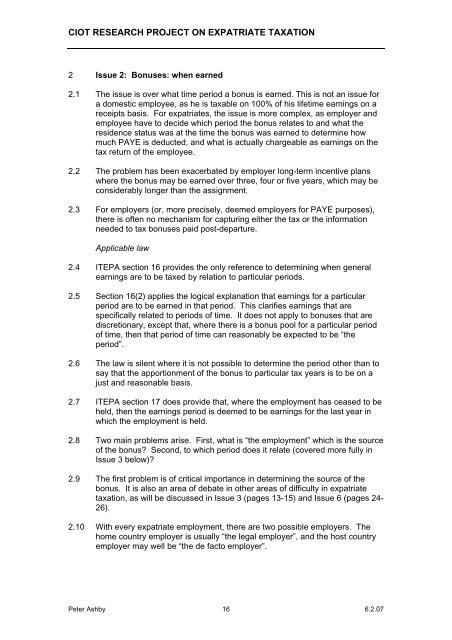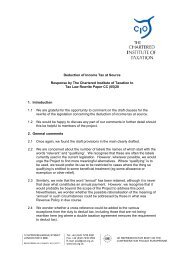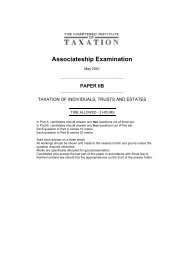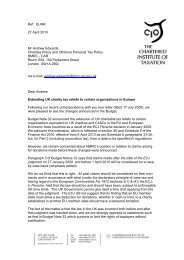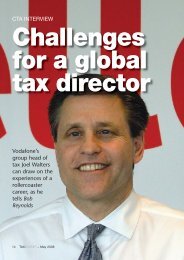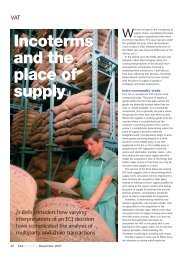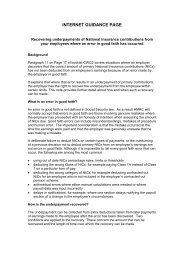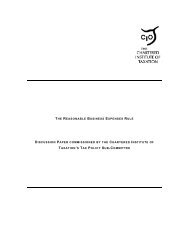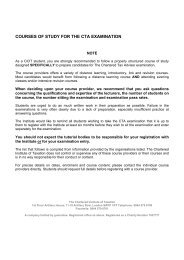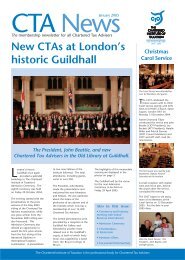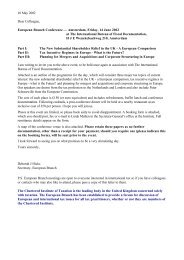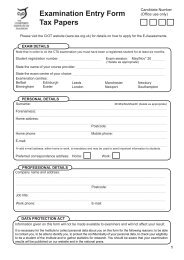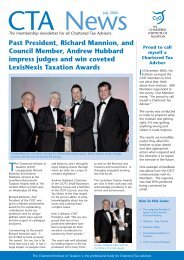Expatriate taxation - CIOT - The Chartered Institute of Taxation
Expatriate taxation - CIOT - The Chartered Institute of Taxation
Expatriate taxation - CIOT - The Chartered Institute of Taxation
You also want an ePaper? Increase the reach of your titles
YUMPU automatically turns print PDFs into web optimized ePapers that Google loves.
<strong>CIOT</strong> RESEARCH PROJECT ON EXPATRIATE TAXATION<br />
2 Issue 2: Bonuses: when earned<br />
2.1 <strong>The</strong> issue is over what time period a bonus is earned. This is not an issue for<br />
a domestic employee, as he is taxable on 100% <strong>of</strong> his lifetime earnings on a<br />
receipts basis. For expatriates, the issue is more complex, as employer and<br />
employee have to decide which period the bonus relates to and what the<br />
residence status was at the time the bonus was earned to determine how<br />
much PAYE is deducted, and what is actually chargeable as earnings on the<br />
tax return <strong>of</strong> the employee.<br />
2.2 <strong>The</strong> problem has been exacerbated by employer long-term incentive plans<br />
where the bonus may be earned over three, four or five years, which may be<br />
considerably longer than the assignment.<br />
2.3 For employers (or, more precisely, deemed employers for PAYE purposes),<br />
there is <strong>of</strong>ten no mechanism for capturing either the tax or the information<br />
needed to tax bonuses paid post-departure.<br />
Applicable law<br />
2.4 ITEPA section 16 provides the only reference to determining when general<br />
earnings are to be taxed by relation to particular periods.<br />
2.5 Section 16(2) applies the logical explanation that earnings for a particular<br />
period are to be earned in that period. This clarifies earnings that are<br />
specifically related to periods <strong>of</strong> time. It does not apply to bonuses that are<br />
discretionary, except that, where there is a bonus pool for a particular period<br />
<strong>of</strong> time, then that period <strong>of</strong> time can reasonably be expected to be “the<br />
period”.<br />
2.6 <strong>The</strong> law is silent where it is not possible to determine the period other than to<br />
say that the apportionment <strong>of</strong> the bonus to particular tax years is to be on a<br />
just and reasonable basis.<br />
2.7 ITEPA section 17 does provide that, where the employment has ceased to be<br />
held, then the earnings period is deemed to be earnings for the last year in<br />
which the employment is held.<br />
2.8 Two main problems arise. First, what is “the employment” which is the source<br />
<strong>of</strong> the bonus Second, to which period does it relate (covered more fully in<br />
Issue 3 below)<br />
2.9 <strong>The</strong> first problem is <strong>of</strong> critical importance in determining the source <strong>of</strong> the<br />
bonus. It is also an area <strong>of</strong> debate in other areas <strong>of</strong> difficulty in expatriate<br />
<strong>taxation</strong>, as will be discussed in Issue 3 (pages 13-15) and Issue 6 (pages 24-<br />
26).<br />
2.10 With every expatriate employment, there are two possible employers. <strong>The</strong><br />
home country employer is usually “the legal employer”, and the host country<br />
employer may well be “the de facto employer”.<br />
Peter Ashby 16 6.2.07


